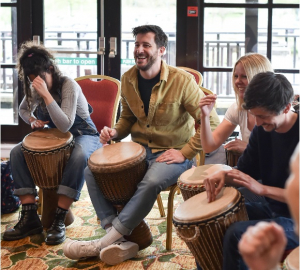Mayday Trust’s Three-Year Strategy to Systems Change
The Problem we want to solve:
The systemic institutionalisation of people accessing support services.
The Mayday Vision:
A world where systems work for people going through tough times.
The Mayday Mission:
To model a person-led, transitional and strength-based system alongside people going through tough times and to build a movement of people and organisations to change the current deficit-based systems.
The three core principles of our work are:
- Listening deeply and learning: We aim to be led by people going through tough times and what matters most to them.
- Demonstrating that a different set of values and relationships is possible and better: offering our person-led, transitional and strengths-based response to people going through tough times, and supporting a growing movement of organisations to adopt and develop that approach.
- Influencing through doing and connecting: We demonstrate how to think and work differently, and we re-design local systems and national policy, with partners including the New System Alliance.
Our values. We are:
- PEOPLE LED In everything we do: we are led by people going through tough times.
- STRENGTH-BASED We always look for people’s strengths and potential in our work, our recruitment and how we work together as a team.
- CHANGE MAKERS We are radical, creative and imagine a very different future, while always being willing to meet people where they are.
- KIND AND CURIOUS We are never afraid to challenge others and ourselves, but we do so with kindness and humility. We are curious and want to learn. We take risks, get things wrong and are open to change.
- RESILIENT We are brave, we persevere and we aim to build our own and others’ resilience. We keep our promises and we don’t give up on people when others write them off.
- INCLUSIVE We are committed to building the inclusiveness and diversity of our team and our work. We challenge oppression and build equality wherever we can.
What has brought us here?
We have come a long way since Mayday first decided to attempt to embody the radical change we recognised was needed in the charity and support sector. We have established a way of offering support which has a strong theoretical base, a host of learning and resources behind it, and a growing evidence base that it works. Some inspirational organisations have joined us on our journey and been inspired to make radical change themselves. We have been influential beyond our size, and the language of being strengths-based and person-led has become commonly (if not always accurately!) used. We have developed the UK-wide New System Alliance and we are described as an important, even ‘totemic’ organisation for people interested in system change. We offer many people in the sector hope.
What can we achieve in the next three years?
Our challenge now is to remain radical inside and out, while growing our impact and reach, and becoming financial sustainable. This plan sets out how we can do those three things and manage the tensions between them. Over three years, we will:
- We will deepen our radicalism by sharing our platform with more people and helping people who have experienced broken systems to lead more change themselves, and to shape our agenda, building a vision for a new public service system around their wisdom. We will continue to build the PTS Response around our relationship-first coaching, which also draws on community development, advocacy, coproduction and rights movements. We will draw on self-organising teams’ models to develop a radically devolved approach to decision-making, sharing power and responsibility.
- We will grow our impact by reaching more people going through tough times with the PTS Response, demonstrating that it can be delivered at scale. We will develop the New System Alliance into a sustainable broadly-based UK partnership and we will launch and grow a UK-wide membership network for organisations delivering coaching. We will explore new partnerships to reach across sector boundaries. We will build our communications reach and support many more organisations and local areas to embed radical but practical change. We will build a person-led and strengths-based approach to outcome and data gathering, and to understanding the impact of system change work. We will share those approaches and use the evidence in creating more impact and shape the national policy debate.
- We will increase our sustainability through building a range of new charitable and earned income sources, through building the whole team’s financial and commercial competence and confidence. We will diversify our team and our support for people’s wellbeing and performance, exploring how to move towards self-managing teams approaches. We will develop an investment policy which supports our ambitions.
System change is complex and requires us to combine different kinds of practical and influencing work. We will bring the different strands of our work together into a more joined-up whole, with at least three beacon areas as one of the most tangible ways to show how the different strands can add up to more impact than the sum of their parts.
Our focus over the three years will follow this path:
Year 1: capacity building. We will grow the team’s capacity and our services and support offers to councils and organisations, and raising awareness with clearer branding and messaging, while maintaining our current income and activity. We will launch the membership network, also building new bidding and delivery partnerships and developing a sustainable model for the New System Alliance. We will finalise our model for evidence gathering and build relationships with citizens and communities.
Year 2: investing in growth and experimentation. We will redeploy our assets through a balanced investment programme that includes growing our most promising and impactful approaches, services and partnerships. We will invest in our evidence-gathering approaches. We will invest in income generation and new forms of fundraising.
Year 3: expansion and bigger reach. We will raise our ambition for scale and reach, taking more risks based on the evidence of the previous two years, and aim for growth across all of our successful income streams. We will expect to make a significant impact on the government post-election.
Key targets:
By the end of year three, we will be reaching around 3,500 people with strengths-based, person-led work, via our own delivery partnerships, and our membership network.
We will be working with three beacon areas where we combine coaching, community development and system change at a strategic level, and our approach and values will be widely understood and valued.
How do we achieve that impact?
Three strategic objectives:
- Deeper impact: continually adapt, personalise and improve all aspects of the PTS Response, based on building our collection and use of evidence about what works for whom.
- Broader impact: Grow and diversify the PTS Response and Coaching Network, directly delivered by Mayday and partner organisations, co-designed with and reaching new groups and sectors.
- Influence local and national charities, provider organisations, NHS and governments to replace dysfunctional public service systems, & build a movement of activists and organisations.
Four building blocks – what we need to build into our organisation to achieve our objectives:
- Build and diversify our income streams including a wider range of grant funders, mission-aligned contracts, membership income and exploring corporate and public fundraising.
- Build and spread the evidence, learning and data for the PTS response and for systems change. Improve and adapt our approach based on what we learn.
- Develop our communications, brand and messaging, in partnership with people who are directly affected by public service systems.
- Make Mayday a consistently supportive, creative and inclusive place for people to work with a high-performing team living our values, and strong internal communications.





 There are lots of things I am going to miss, too many to list here (and probably not that interesting for you to read…) but leaving my role at Mayday was one of the toughest parts of the decision. I don’t underestimate how lucky I am that the role was developed with me in mind: Director of Change, changing the landscape, changing attitudes, changing systems. An incredibly exciting opportunity to have a real impact in how people going through the toughest of times interact with the services that should be there to walk alongside, listening, responding and focusing on what people can do, not what they can’t. It’s been a challenging couple of years, with lots of change. Mayday’s visionary Chief Executive decided it was time to
There are lots of things I am going to miss, too many to list here (and probably not that interesting for you to read…) but leaving my role at Mayday was one of the toughest parts of the decision. I don’t underestimate how lucky I am that the role was developed with me in mind: Director of Change, changing the landscape, changing attitudes, changing systems. An incredibly exciting opportunity to have a real impact in how people going through the toughest of times interact with the services that should be there to walk alongside, listening, responding and focusing on what people can do, not what they can’t. It’s been a challenging couple of years, with lots of change. Mayday’s visionary Chief Executive decided it was time to 



